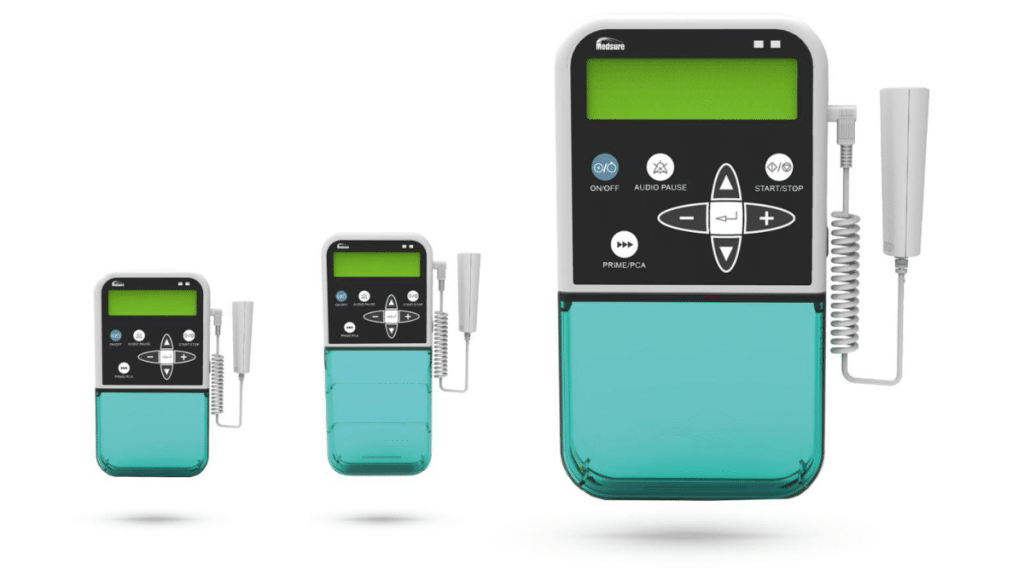An ambulatory infusion pump is a small, portable system that provides medication delivery. It sends medications like chemotherapy and antibiotics to the body as needed for continuous treatment. It enables patients to conduct their regular activities outside of hospital facilities. Ambulatory pumps have gained popularity because healthcare facilities need adaptable treatment delivery alternatives.
The Well Lead Medsure 3000 series ambulatory infusion pump focuses on multiple infusion regimens, including cancer treatment and pain management. This device provides multiple infusion rate options alongside a trustworthy alarm system, which helps meet the unique needs of different patients.
Importance of Ambulatory Infusion Pumps in Infusion Therapy
The ambulatory infusion pump helps patients by making treatment easier. It also cuts down on hospital stays and lowers medical costs.
The benefits it brings are obvious:
- Precise Control of Infusion Rate and Dose: An ambulatory infusion pump uses microprocessor-driven flow regulators to control each dose precisely. It ensures accurate drug delivery when tackling complex infusion regimens.
- Multiple Functions for Different Needs: Contemporary pumps have programmable infusion modes, error detection algorithms, and customizable bolus settings. They can adjust to intermittent, continuous, or patient-controlled regimens within a single device.
- Improved Efficiency for Healthcare Workers: The ambulatory infusion pump lowers manual tracking tasks while logging data and generating automated alerts. It also supports on-the-fly rate adjustments without intruding on workflow or therapy accuracy.
- Enhanced Patient Comfort: Its compact design and battery-powered operation empower unobtrusive mobility. Patients can continue daily activities while receiving therapy. Hence, it decreases hospital stays and increases physical recovery.
Clinical Application Scenarios of Ambulatory Infusion Pumps
As medical technology advances, the use of ambulatory infusion pumps is increasing.
(1) Postoperative Analgesia
Operative procedures frequently evoke pain, which consists of three aspects: inflammatory conditions alongside nociceptive stimuli and neuropathic elements. To manage this pain, it is important to maintain stable plasma drug levels. This helps with continuous nerve blocks and local wound infusions. Ambulatory infusion pumps are key to maintaining this stability.
(2) Labor Analgesia
The initial labor phase primarily generates visceral pain caused by cervical stretching; somatic pain from the perineum emerges towards the later part. A maternal ambulatory infusion system maintains controlled low-dose delivery of epidural anesthetic medications. It allows women to move around and reduce excessive sympathetic nerve activity. Such management lowers the risk of fetal distress linked to high maternal analgesic levels. The system enables real-time treatment changes based on cervical changes and contractions.
Good labor pain management can reduce discomfort. It also helps lower postpartum hormonal spikes. This supports breast milk production and aids in recovery.
(3) Cancerous Analgesia
Cancer pain often results from tumor invading tissues. This invasion causes cellular damage and neuropathic pain. Healthcare providers prefer ambulatory infusion pumps as a method to deliver opioids. This can include medications like ketamine and clonidine.
Continuous administration is key for metastatic bone pain, which can become refractory to intermittent dosing. Persistent cancer patients feel better when medical staff injects targeted medicine into their intrathecal or epidural spaces. This helps alleviate their intense breakthrough pain episodes. In this case, intensive pain medication helps maintain body functions as well as supports ongoing cancer treatments.
(4) Tumor Chemo
Chemotherapy plays a vital role in cancer treatment. It targets small cancer spreads, known as micrometastases. This can happen through adjuvant, neoadjuvant, and palliative care. Ambulatory infusion pumps let patients get steady doses of 5-fluorouracil. This helps lower acute side effects. This treatment requires precise plasma levels, especially for colorectal and breast cancer.
Using infusion pumps in outpatient oncology enhances patient convenience and improves tumor suppression. Customizable infusion rates help healthcare providers assess treatment effectiveness while considering patient comfort.
What Can You Get from Well Lead Medsure 3000 Series
The Well Lead Medsure 3000 Series ambulatory infusion pump from Well Lead Medical (a leading ambulatory infusion pump manufacturer) is for multiple clinical applications, including labor analgesia, postoperative pain management, cancerous analgesia, and chemotherapy.
It offers a broad infusion rate range for therapeutic needs. The device’s reliable alarm system guarantees prompt detection of occlusions or low battery for patient safety. Additionally, it supports multiple infusion modes for flexibility in treatment protocols.
Well Lead Medsure 3000 series ambulatory infusion pump: Safer, Smarter, Easier
With user-centric features, the Well Lead Medsure 3000 Series accentuates safety and ease of use. Its interface simplifies parameter settings to avoid user errors.
- It can perfectly meet several clinical analgesic demands.
- Powerful function, easy to carry, multiple drug delivery modes
- Can be applied to multiple departments such as anesthesiology, obstetrics, oncology, pain management, etc.
Adopting a reliable ambulatory infusion pump not only enhances the efficiency and quality of medical care but also provides patients with a safer and more comfortable treatment experience. For more detailed information, you can visit Well Lead Medical’s official website.

